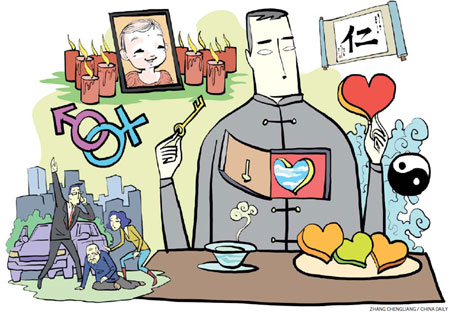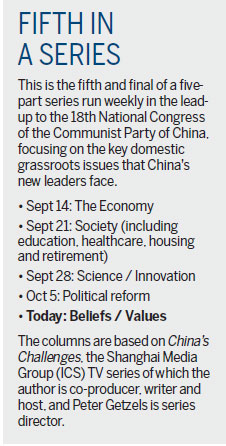What do the Chinese people believe?
Updated: 2012-10-12 10:01
By Robert Lawrence Kuhn (China Daily)
|
|||||||||||


In 2006, an old woman fell, fracturing a bone. A young man called Peng Yu helped her up and sent her to the hospital. Later the old woman claimed that Peng was the one who had injured her and sued him for damages. The court found Peng liable, ordering him to pay 46,000 yuan ($7,300, 5,600 euros).
In 2011, after several cases of apparent helpers being sued, the shocking "Xiao Yueyue event" occurred. A two-year-old girl, Yueyue, was run over by two cars, one after another. For seven minutes, 18 passers-by ignored her. Finally, a garbage woman picked her up but the child died. The Chinese people were horrified.
When I'm with Chinese friends, they appreciate China's remarkable transformation - but they worry. "What do we believe in?" they ask themselves. "What are our values?"
These challenges are what China's new leaders face.
For over two millennia, China's values were exemplified by Confucian ethics. But when extreme leftism replaced Confucianism as the nation's guiding philosophy - especially during the chaotic and ruinous "cultural revolution" (1966-76) - China's traditional teachings of humanism and piety were rejected and renounced. Then came the market economy, rewarding individual initiative, so that collectivist values seemed no longer relevant. Where then values?
Yang Sheng was a businessman, and like others, his life was busy making money. But after losing money, he suffered declining health and rethought his life. Yang decided to stop seeking wealth and become a philanthropist, self-styled. On his own, he sought families needing financial aid. His goal is to help 10,000 disadvantaged kids.
In China, when someone selflessly helps others, he's called "a living Lei Feng". Lei Feng was a young soldier in the People's Liberation Army, immortalized as the personification of altruism. He was born poor, orphaned, joined the Communist Party of China, and died in 1962 - age 21 - while doing his duty. Lei Feng's diary contains selfless aphorisms, such as: "The goal of being alive is to help others live a better life." On China's annual "Learn from Lei Feng Day", doctors examine citizens for free, barbers cut seniors' hair gratis, children visit old-age homes.
But the Chinese people no longer "speak with one mind". Some say that the selfless model, which works in a collectivist economy where the State owns everything, is ill-suited in a market economy where personal reward motivates action. Some surmise that Lei Feng himself is an embellishment.
Yet, Lei Feng's significance is that he personifies virtue - an idealized image reminding us that people should do good to others, have sympathy for suffering, and abide by a moral code.
So is there really any difference between "believing in" Lei Feng - or in Confucius or Buddha? Actually, to many Chinese, religious belief itself is rather vague. The focus is more on common features of different religions than on their contrasting dogmas. As long as a belief advises people to do good, it is a good belief. China has never been ruled by religious power, and although China has had frequent and bloody wars, none were religious.
Officially, there are 100 million religious believers in China. In truth, there are way more. One reason is that Buddhists and Taoists may not attend temples. Another is that believers cannot be members of the ruling party (CPC), so those who seek political advancement or support won't claim to be religious. Still another is that some officials are uneasy with the growth of religion.
Religion is growing in China; while the reasons can be debated, the facts cannot. Freedom of religion as a basic right has been included in China's Constitution since 1982; yet there are claims of religious tensions and problems - and they are too passionate and too persistent to ignore.
Chinese law regulates religion, such that Protestantism, for example, can conduct its missions only at religious venues sanctioned by the State. To me, a Westerner, such law restricts religious freedom, but church leaders in China disagree, noting that China's rules on religion reflect China's culture and history.
One cannot complain about the number of religious venues. In China today there are about 140,000 places of worship for Buddhism, Taoism, Islam, Protestantism and Catholicism. Protestantism leads with about 56,000 churches.
While the rise of religion is changing part of Chinese society, the equality of women is changing all of it. Mao Zedong said famously, "Women hold up half the sky", and in today's China successful women have become unremarkable. From business and government to science and sports, Chinese women can and do rise to the top.
Women working is nothing new; in the planned economy, most women had jobs. The difference now is that women can rise to high positions - in large organizations or by starting their own companies. Gender equality is increasing, in education certainly, and in society.
What about sex? In the early Communist period, sex was repressed and sexuality was hidden. That's why, some years ago, I was amazed to see People's Daily, the Party newspaper, run an article on "The Top 10 Sex Stories of the Year". The government's Xinhua News website features "Most Desirable Women Around World" - with photos aplenty.
How much control should government have over the sex lives of its citizens, whether online or in real life? Where to draw the line between individual freedom and social sensibilities?
Li Yinhe is a sexologist. A scholarly sociologist in her 60s, she seems determined to change the Chinese people's attitudes about sex - which is why she is loved or hated, sanctified or damned. "Premarital chastity was extremely strict in ancient China," she says. "Even though 70 percent of Chinese people no longer hold on to premarital chastity, I am called a demon by merely reporting the number."
Until 1995, premarital sex was even illegal, according to "the hooligan law". Until 1997, homosexuality was a crime and labeled a disease. Today, over 90 percent believe homosexuals should have equal opportunities. Divorce in the 1970s was 2 percent. Now it is 20 percent (Li says the real number is higher).
In 2012, China's National Museum celebrated its centennial by exhibiting Renaissance masterpieces, including David, the famous sculpture by Michelangelo. In a news broadcast on CCTV, David's genitals were covered up with mosaic effects. Netizens instantly uploaded widespread criticism. In the CCTV rebroadcast three hours later, the mosaic was removed.
What do Chinese people believe? What values work today? Chinese tradition? The Communist ideal of Lei Feng? Moral model? Religion? Materialism? Nationalism?
While many have ready answers, no one has robust answers. Perhaps what China needs most is more time.
In 2011, a 31-foot bronze statue of Confucius was set up in front of the National Museum in Tiananmen Square. Four months later the statue disappeared.
China's new leaders face the challenge of belief and value.
The Chinese people wonder and wait.
Dr Robert Lawrence Kuhn is an international corporate strategist and investment banker. He is the author of The Man Who Changed China: The Life and Legacy of Jiang Zemin and How China's Leaders Think (featuring China's new leaders). He is a regular commentator on China (BBC, Bloomberg, CCTV, CNBC and Euronews). The views expressed in the article do not necessarily reflect those of China Daily.
(China Daily 10/12/2012 page8)
Today's Top News
Rescuers race against time for quake victims
Telecom workers restore links
Coal mine blast kills 18 in Jilin
Intl scholarship puts China on the map
More bird flu patients discharged
Gold loses sheen, but still a safe bet
US 'turns blind eye to human rights'
Telecom workers restore links
Hot Topics
Lunar probe , China growth forecasts, Emission rules get tougher, China seen through 'colored lens', International board,
Editor's Picks

|

|

|

|

|

|





